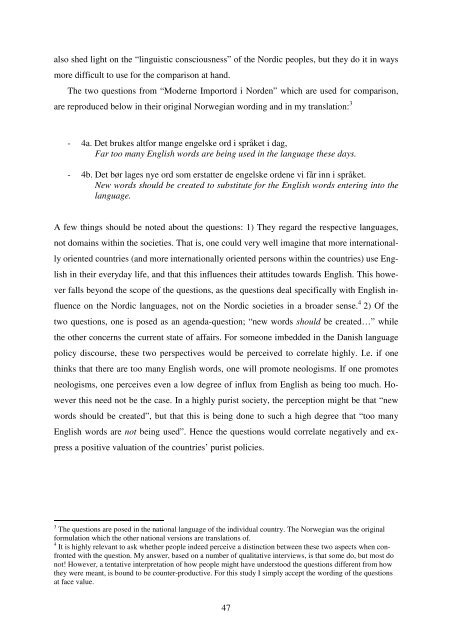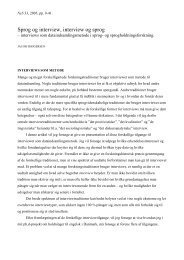Hør dog hvad de siger - Note-to-Self: Trials & Errors
Hør dog hvad de siger - Note-to-Self: Trials & Errors
Hør dog hvad de siger - Note-to-Self: Trials & Errors
You also want an ePaper? Increase the reach of your titles
YUMPU automatically turns print PDFs into web optimized ePapers that Google loves.
also shed light on the “linguistic consciousness” of the Nordic peoples, but they do it in ways<br />
more difficult <strong>to</strong> use for the comparison at hand.<br />
The two questions from “Mo<strong>de</strong>rne Impor<strong>to</strong>rd i Nor<strong>de</strong>n” which are used for comparison,<br />
are reproduced below in their original Norwegian wording and in my translation: 3<br />
- 4a. Det brukes altfor mange engelske ord i språket i dag,<br />
Far <strong>to</strong>o many English words are being used in the language these days.<br />
- 4b. Det bør lages nye ord som erstatter <strong>de</strong> engelske or<strong>de</strong>ne vi får inn i språket.<br />
New words should be created <strong>to</strong> substitute for the English words entering in<strong>to</strong> the<br />
language.<br />
A few things should be noted about the questions: 1) They regard the respective languages,<br />
not domains within the societies. That is, one could very well imagine that more international-<br />
ly oriented countries (and more internationally oriented persons within the countries) use Eng-<br />
lish in their everyday life, and that this influences their attitu<strong>de</strong>s <strong>to</strong>wards English. This howe-<br />
ver falls beyond the scope of the questions, as the questions <strong>de</strong>al specifically with English in-<br />
fluence on the Nordic languages, not on the Nordic societies in a broa<strong>de</strong>r sense. 4 2) Of the<br />
two questions, one is posed as an agenda-question; “new words should be created…” while<br />
the other concerns the current state of affairs. For someone imbed<strong>de</strong>d in the Danish language<br />
policy discourse, these two perspectives would be perceived <strong>to</strong> correlate highly. I.e. if one<br />
thinks that there are <strong>to</strong>o many English words, one will promote neologisms. If one promotes<br />
neologisms, one perceives even a low <strong>de</strong>gree of influx from English as being <strong>to</strong>o much. Ho-<br />
wever this need not be the case. In a highly purist society, the perception might be that “new<br />
words should be created”, but that this is being done <strong>to</strong> such a high <strong>de</strong>gree that “<strong>to</strong>o many<br />
English words are not being used”. Hence the questions would correlate negatively and ex-<br />
press a positive valuation of the countries’ purist policies.<br />
3 The questions are posed in the national language of the individual country. The Norwegian was the original<br />
formulation which the other national versions are translations of.<br />
4 It is highly relevant <strong>to</strong> ask whether people in<strong>de</strong>ed perceive a distinction between these two aspects when confronted<br />
with the question. My answer, based on a number of qualitative interviews, is that some do, but most do<br />
not! However, a tentative interpretation of how people might have un<strong>de</strong>rs<strong>to</strong>od the questions different from how<br />
they were meant, is bound <strong>to</strong> be counter-productive. For this study I simply accept the wording of the questions<br />
at face value.<br />
47



